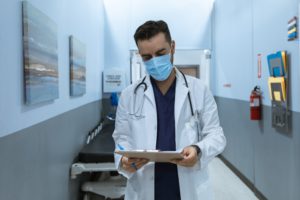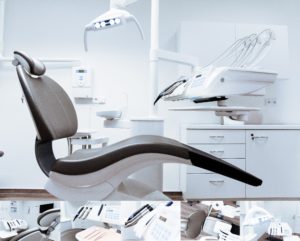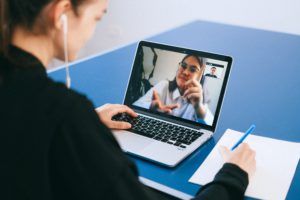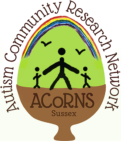How can healthcare be made more accessible for autistic people? This was our second event held on 24th March: full resources are at the end of this blog post. Seven speakers presented their experiences and new initiatives.
Dr Stephanie Daley from the Brighton & Sussex Medical School (BSMS) updated on an exciting new programme, Time for Autism, based on the award-winning Time for Dementia initiative. Families have been concerned about doctors’ lack of awareness and understanding about autism, creating challenges in providing care and treatment in ways that consider the specific needs of autistic patients. Parents felt that communication between healthcare professionals was not efficient and that they, as the experts on their child, should be listened to more. Time for Autism starts in September 2021 as a mandatory part of medical student training at BSMS. Each student will visit a family with an autistic child over the course of a year. The goal is for the medical students to develop a relationship with the families and learn about their lived experiences, creating a new generation of doctors who can adapt to better suit the needs of families and their autistic child. The project is encouraging families to sign up to take part: find out more or contact Alison Smith on sc-tr.timeforautism@nhs.net
will visit a family with an autistic child over the course of a year. The goal is for the medical students to develop a relationship with the families and learn about their lived experiences, creating a new generation of doctors who can adapt to better suit the needs of families and their autistic child. The project is encouraging families to sign up to take part: find out more or contact Alison Smith on sc-tr.timeforautism@nhs.net
Dr Samantha Holt, a researcher in autism from the Children and Technology Lab shared her experiences as a parent of an autistic daughter. A GP visit means an unfamiliar and busy environment, creating anxiety and increasing her daughter’s stress. Sam shared strategies she has developed, such as bringing a DVD player with her daughter’s favourite movies playing and asking for a separate place to wait. She recalled a time that her daughter was seriously ill and the difficulty of getting into an ambulance, as the system could not cope with them arriving in the family car.
Health outcomes in autistic people are much poorer than for the population in general. Following the tragic death of Oliver McGowan, his mother Paula McGowan campaigned for mandatory training in autism and learning disabilities for health practitioners and she shared recent progress. The Oliver McGowan Mandatory Training in Learning Disability and Autism Awareness, co-designed by autistic people, is based on the Capabilities Framework for Supporting People with a Learning Disability and Autistic People respectively. It aims to educate all health and social care staff on what these conditions are, how to apply reasonable adjustments consistently across contexts, and for staff to reflect on their own behaviours, biases and prejudices. Another goal Paula has is for health practitioners to develop skills to communicate well with the patients themselves and to work with them collaboratively on their treatment. The ultimate objective is for learning disabled and autistic people to have similar health outcomes as for the general population.
Dr Jennifer Parry, consultant in paediatric dentistry from the Sussex Com munity Foundation NHS Trust, described her work to overcome the difficulties of attending dental care experienced by autistic people. The Trust has increased training in autism for staff following feedback during the pandemic. The training includes 2 videos. The first is the surgery as experienced by an autistic person, vividly illustrating triggers for anxiety such as the instruments and the reclining chair. The second video shows how staff can give time, space and clear instructions to ease these anxieties.
munity Foundation NHS Trust, described her work to overcome the difficulties of attending dental care experienced by autistic people. The Trust has increased training in autism for staff following feedback during the pandemic. The training includes 2 videos. The first is the surgery as experienced by an autistic person, vividly illustrating triggers for anxiety such as the instruments and the reclining chair. The second video shows how staff can give time, space and clear instructions to ease these anxieties.
Dr Ian Male and Will Farr DPhil of the autism diagnostic clinic at Sussex Community Foundation NHS Trust shared their current project on improving the diagnostic pathways for Autism. The pandemic has accelerated the move from in-person to digital visits such as online GP calls and video observation. The project came about because of the long waiting times and growing waiting lists for autism diagnosis. Many families saw the use of video observation as positive, but it also places challenges to standardised testing, as variations in the environment affect reliability and validity of diagnostic testing.
Finally, Professor Nicola Yuill from the Children & Technology Lab shared early work on the new Our Stories project, in collaboration with ACoRNSoton. Our Stories builds on the Autism Transitions project which co-creates video stories showing the perspectives of autistic children. The Sussex part of Our Stories is working with Time for Autism and with Just Right, an initiative in Brighton & Hove schools that supports children to manage their emotions in the classroom environment to help them be in the best frame of mind for learning. Our Stories is working with a technology company, Autek, producing these video stories with children and young people and making virtual tours of settings so people can ‘walk round’ before an in-person visit.
The breakout groups produced lively discussions about how health services could adapt, and whether these new initiatives might help close the health gaps. People felt that differences between autism and learning disabilities are not always recognised by health and social care professionals, so they appreciated the separation of the two in the Oliver McGowan Mandatory Training in Learning Disability and Autism Awareness. Some shared past experiences where they were not able to access resources they needed because the support was restricted to people with diagnoses of both autism and a learning disability. Participants also felt positive about the Time for Autism programme. One person spoke about their experience training as a GP in the 80’s when autism was a very niche topic, whereas now there is more focus on needs of this group. This is a great opportunity for medical students to have a hands-on experience to really understand autistic young people’s lives.
The move from in-person to online diagnosis has produced different experiences. One parent said her autistic daughter struggled to engage with online material. Some children and young  people struggle to concentrate long enough online for clinicians to make accurate observations and assessments. However, there is an advantage of seeing children and young people behave how they normally would in their own environment rather than in a clinic. Professor Nicola Yuill highlighted a feedback event on 6th May, on the Zoom or Room project comparing online and in-person therapeutic interactions: register here.
people struggle to concentrate long enough online for clinicians to make accurate observations and assessments. However, there is an advantage of seeing children and young people behave how they normally would in their own environment rather than in a clinic. Professor Nicola Yuill highlighted a feedback event on 6th May, on the Zoom or Room project comparing online and in-person therapeutic interactions: register here.
There was a strong feeling that there was no ‘one size fits all’ across the very broad spectrum of autism. A “dental passport”, similar to a hospital passport was suggested for staff to easily access their client’s profile and specific needs. We also discussed the need for a multidisciplinary team for autism diagnosis, for example a team including paediatrician, educational psychologist, clinical psychologist, speech and language therapist, child development service and social services. This way, different specialities and ranges of skills can be combined to assess the client. People felt that insufficient capacity in children and adolescent mental health services (CAMHS) was a barrier and that better links need to be put in place to create an efficient support system for after diagnosis.
Resources
Dr Stephanie Daley
Dr Sam Holt
Paula McGowan (Edited Interview)
Paula McGowan (Full Interview)
Dr Jennifer Parry
Dr Ian Male and William Farr DPhil Presentation
